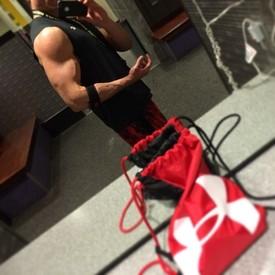Frozen Vegetables

luca15306
Posts: 111 Member
This may be along the same lines as previous questions I have had, for rice and pasta, but this time it is frozen broccoli, I weigh it frozen as I then mix it with other ingredients, but would the final cooked product have more or less calories cooked than frozen? like am I over or under estimating the calories?
thanks so much in advance, this kind of thing really stresses me out, as I like to be very accurate when cooking!
thanks so much in advance, this kind of thing really stresses me out, as I like to be very accurate when cooking!
0
Replies
-
i would assume gram for gram the cooked has less calories, since water is absorbed by the broccoli during cooking, but i imagine the weight difference would be negligible. but its not worth stressing over, especially for something as low cal as broccoli
edited to fix more to say less0 -
I agree with BigT555. Even if it doubles the calories of the broccoli, it's still just broccoli. You're looking at maybe a 25 calorie difference at worst, and that shouldn't be enough to throw anything off if you're already eating steadily at your daily calorie goal.0
-
Every calorie you ever count is an estimate. Worrying about the cooked v raw v frozen weight of broccoli will drive you mad, for no real result. Eat around your goal, be a diligent as you can, but don't obsess the minutiae, because in the end, you can't be spot on anyway.0
-
Wouldn't absorbing water make the broccoli lower calorie, gram for gram? What you're eating is more water and less broccoli than before it absorbed the water.i would assume gram for gram the cooked has more calories, since water is absorbed by the broccoli during cooking, but i imagine the weight difference would be negligible. but its not worth stressing over, especially for something as low cal as broccoli0 -
Frozen veggies may have ice clinging to them; cooked veggies may absorb a little water. Either way you're actually overestimating the calories *very* slightly because the scale would read a hair more than the actual weight of vegetable--but it's not enough to make a real difference.0
-
yea sorry thats what i meant to say
Wouldn't absorbing water make the broccoli lower calorie, gram for gram? What you're eating is more water and less broccoli than before it absorbed the water.i would assume gram for gram the cooked has more calories, since water is absorbed by the broccoli during cooking, but i imagine the weight difference would be negligible. but its not worth stressing over, especially for something as low cal as broccoli0 -
I figured it was. And, like you said, any differences will be insignificant anyway.
yea sorry thats what i meant to say
Wouldn't absorbing water make the broccoli lower calorie, gram for gram? What you're eating is more water and less broccoli than before it absorbed the water.i would assume gram for gram the cooked has more calories, since water is absorbed by the broccoli during cooking, but i imagine the weight difference would be negligible. but its not worth stressing over, especially for something as low cal as broccoli0 -
Whenever you process a food (not the evil "industrial" processing, any preparation) you change its caloric profile, mostly through density changes. As long as you eat that portion fully (and there are no losses or additions like cooking in oil or de-starching potatoes by soaking in water), it doesn't matter if they are cooked, raw, minced or clumped.
The easiest example I can think of is rice. One cup of uncooked rice has many more calories than one cup of fluffy, cooked, ready to eat rice.
So, what do you do? You estimate your calories based on the condition of the food at the time of measurement. If you're cooking fresh broccoli, put that in the scale. If you're using frozen broccoli, measure in that condition. If it's already cooked, do a volumetric (less accurate) assessment of the food. E.g. one cup of cooked oatmeal may or man not be a dry "serving" depending on how much water you like in it.0 -
Thanks a lot everyone, I realise now that the calorie difference would be pretty small. I just like to be accurate.
I don't usually have frozen broccoli, prefer to buy fresh, but bought this for something a few weeks back, and now want it gone, so am going to eat it all (as part of a balanced meal of course ) thanks again
) thanks again  x 0
x 0 -
you can't be "accurate" as government standards (at least in the US) allow for a 10% variance from the reported results.0
-
ya you dont weigh anything frozen
doesnt it say on pack
1/2 cup cooked and calories?
cook it seperate , then weigh it0 -
I ALWAYS weigh my food cooked. Unless the back of the package says otherwise.
Frozen food has water / ice and will distort the weight.
As long as you're consistent on how you weigh every time the difference is minuscule and won't mean anything.0 -
Cooked foods provide more energy/calories than raw food because they are more easily digested making more of the nutrients available to be burned as energy. That's one reason why humans were able to build great cities after learning to use fire and cook food. The builders of the pyramids were not eating a paleo or raw food diet. Broccoli is so low in calories cooked or raw that you shouldn't stress out about it, or anything else for that matter. Life is to short to sweat the small stuff. Its OK to want to know, but try not to obsess about things like that. I hope the raw food police don't come get me for my comment Haha. Come see me, I have great healthy recipes and articles on my blog at www.3xlweightloss.com
Where did you find this tid bit of info? Perhaps it's that once they started to use fire they were able to cook meat and got the needed protein in their diet. It's widely known that raw veggies are more nutritious than cooked.0 -
I either:
Weigh it raw and put the raw info into the journal (raw veggies mostly)
OR
Weigh it cooked and put a cooked entry in the journal (meats, mostly)
Not sure why...
I guess I just assume that if I start with a raw veggie and weigh it, even if it "shrinks" and the weight goes down, the volume goes down, there's still at least the name number of kcal there. And, the accurate veggie entries on MFP are generally from USDA, which only talks about the raw version.
There are plenty of entries for cooked meats from USDA.
I'm not sure if that even makes sense.0 -
Cooked foods provide more energy/calories than raw food because they are more easily digested making more of the nutrients available to be burned as energy. That's one reason why humans were able to build great cities after learning to use fire and cook food. The builders of the pyramids were not eating a paleo or raw food diet. Broccoli is so low in calories cooked or raw that you shouldn't stress out about it, or anything else for that matter. Life is to short to sweat the small stuff. Its OK to want to know, but try not to obsess about things like that. I hope the raw food police don't come get me for my comment Haha. Come see me, I have great healthy recipes and articles on my blog at www.3xlweightloss.com
Where did you find this tid bit of info? Perhaps it's that once they started to use fire they were able to cook meat and got the needed protein in their diet. It's widely known that raw veggies are more nutritious than cooked.
Not in every case...
Cooking does change the nutrition make up, however, in some veggies cooking them brings out even more nutrition, where in others, cooking them reduces nutrition.
For example:
http://www.healthaliciousness.com/nutritionfacts/nutrition-comparison.php?o=11510&t=11508&h=11507&s=151.00&e=114.00&r=130.00
For some reason, cooking it causes the Vitamin A and C to increase.0
This discussion has been closed.
Categories
- All Categories
- 1.4M Health, Wellness and Goals
- 398.2K Introduce Yourself
- 44.7K Getting Started
- 261K Health and Weight Loss
- 176.4K Food and Nutrition
- 47.7K Recipes
- 233K Fitness and Exercise
- 462 Sleep, Mindfulness and Overall Wellness
- 6.5K Goal: Maintaining Weight
- 8.7K Goal: Gaining Weight and Body Building
- 153.5K Motivation and Support
- 8.4K Challenges
- 1.4K Debate Club
- 96.5K Chit-Chat
- 2.6K Fun and Games
- 4.8K MyFitnessPal Information
- 12 News and Announcements
- 21 MyFitnessPal Academy
- 1.5K Feature Suggestions and Ideas
- 3.2K MyFitnessPal Tech Support Questions










